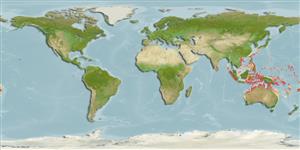>
Gobiiformes (Gobies) >
Gobiidae (Gobies) > Gobiinae
Etymology: atrinasa: Named for the jet black anterior nasal tubes ('ater' = jet black; 'nasus' = nose); noun in apposition.
Eponymy: Susan Lee Jewett (formerly Susan J Karnella) (d: 1945). (Also see Jewett & Susan (Jewett)). In the genus’ name, ‘Sue’ is attached to Eviota, a related genus. (Ref. 128868), visit book page.
More on authors: Winterbottom & Hoese.
Environment: milieu / climate zone / depth range / distribution range
Ekologi
laut berasosiasi dengan karang; kisaran kedalaman 18 - 20 m (Ref. 39927). Tropical
Indo-West Pacific.
Size / Weight / umur
Maturity: Lm ? range ? - ? cm
Max length : 2.0 cm SL jantan/; (Ref. 39927)
deskripsi pendek
Kunci identifiaksi (pengenalan) | Morfologi | Morfometrik
Duri punggung (Keseluruhan (total)) : 7; duri punggung lunak (Keseluruhan (total)) : 9; Duri dubur: 1; Sirip dubur lunak: 8. Second dorsal fin with 1 spine and 9 soft rays; second dorsal spines filamentous in males. Anterior nasal tube elongate, 10-15% HL, black except at extreme base. An oblique black spot behind orbit, followed by 2 black vertical bars on each side of the nape. Presence of an anterior and, usually, a posterior interorbital pore; a postocular and an infraorbital pore; preopercular pores absent (Ref. 39927); characterized further by longitudinal scale series 24; ctenoid scales on body except cycloid near midline of abdomen and anterolaterally behind lower pectoral fin base; scaleless head, nape, pectoral fin base and breast; depth of body 4.3 in SL (Ref. 90102).
Inhabits reef crevices 10-30 m (Ref. 90102).
Life cycle and mating behavior
Kematangan | Reproduksi, perkembang biakan | Pemijahan | telur-telur | Fecundity | Larva
Winterbottom, R. and D.F. Hoese, 1998. A new genus and four new species of fishes from the Indo-West Pacific (Pisces; Perciformes; Gobiidae), with comments on relationships. R. Ont. Mus. Life Sci. Occas. Pap. (37):1-17. (Ref. 39927)
Status IUCN Red List (Ref. 130435: Version 2024-1)
ancaman kepada manusia
Harmless
penggunaan manusia
Perikanan: tidak ada kepentingan
Alat, peralatan
laporan khas
muat turun XML
Sumber internet
Estimates based on models
Preferred temperature (Ref.
123201): 25.1 - 29.3, mean 28.5 °C (based on 1337 cells).
Phylogenetic diversity index (Ref.
82804): PD
50 = 0.5078 [Uniqueness, from 0.5 = low to 2.0 = high].
Bayesian length-weight: a=0.01023 (0.00477 - 0.02194), b=3.01 (2.83 - 3.19), in cm total length, based on LWR estimates for this (Sub)family-body shape (Ref.
93245).
Trophic level (Ref.
69278): 3.0 ±0.3 se; based on size and trophs of closest relatives
Daya lenting (Ref.
120179): Rendah, Waktu penggandaan populasi minimum 4.5 - 14 tahun (Assumed Fec < 100).
Fishing Vulnerability (Ref.
59153): Low vulnerability (10 of 100).
Nutrients (Ref.
124155): Calcium = 449 [194, 1,616] mg/100g; Iron = 2.01 [0.81, 4.58] mg/100g; Protein = 18 [16, 20] %; Omega3 = 0.165 [0.049, 0.537] g/100g; Selenium = 32.3 [9.2, 96.3] μg/100g; VitaminA = 107 [20, 577] μg/100g; Zinc = 5.16 [2.67, 8.91] mg/100g (wet weight);
